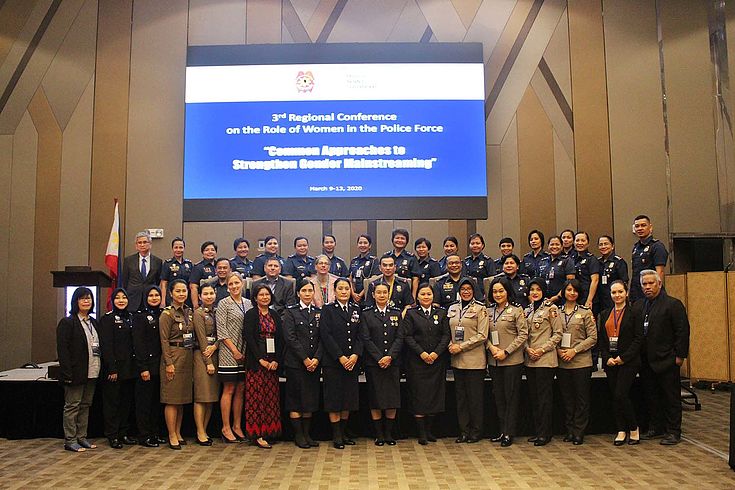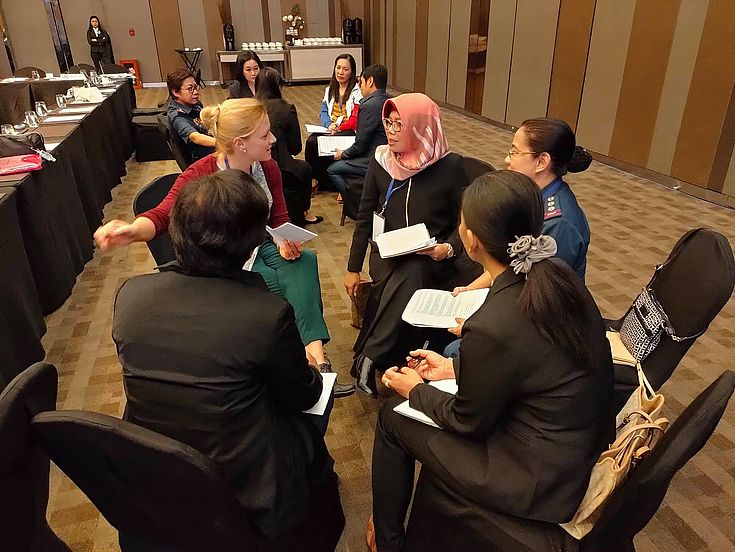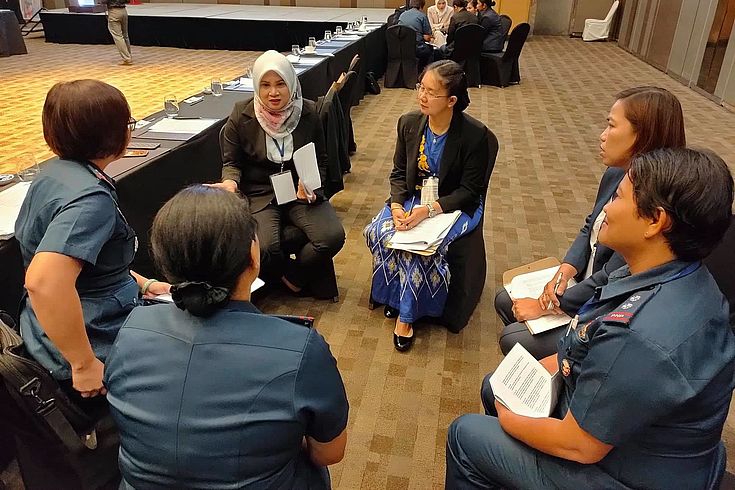Promoting the Role of Policewomen in Community-Oriented Policing
3rd Regional Conference on the Role of Women in the Police Force

HSF
The activity was conducted with the theme “Common Approaches to Strengthen Gender Mainstreaming,” Attended by police officials from Southeast Asia and held at the Novotel Manila Araneta City in Quezon City, the two day conference provided the forum for women police officers to share their respective country police organizations’ approaches to strengthen gender mainstreaming, gender balance, and then adopt common strategies in community-oriented policing, taking into account country-specific historical, cultural, social and religious considerations, among others. The conference provided the opportunity for information exchange as these relate to each of the countries police organizations’ programs which impact the careers and general welfare of police women.
PNP Deputy Chief for Operations Police Lieutenant General Guillermo Eleazar welcomed the delegates. Also present during the opening ceremony was German Ambassador to the Philippines Anke Reiffenstuel. During the conference, Polizeirätin Susanne Kullman of the Bavarian Police gave a presentation about “Women and Leadership: Challenges in the Bavarian Police” in which she addressed the rights and advantages as well as the restrictions of female police officers in the Bavarian Police. Country participants discussed the challenges and opportunities for policewomen in their respective police organizations, how women are selected for senior-level positions, the current and proposed programs to strengthen gender mainstreaming and improve gender balance in the police force and the linkages with local and international organizations/networks to promote the role of women in the police force. They admitted to the existence of the general concern of gender inequality though different depending on the country, and agreed in the need to better address and prepare their female as well as male police officers through additional training and programs.

HSF
A group exercise with the main objective to identify the common strategies and practices in the promotion of upward mobility and career growth of women police officers, and the role of policewomen in community-oriented policing was conducted. Participants were divided into corresponding groups each discussing and making recommendations for: (a) Conditions in the police organization which promote the development/further development of women in the organization; (b) Approaches to promote the strengths of women police officers and selection of women police officers for training to qualify them for senior-level positions and how to successfully engage the police leadership to support these initiatives; (c) Approaches in response to modern trends in policing and advances in technology to allow wider participation of policewomen in policing activities; (d) Approaches in response to challenges and opportunities for expanded participation of policewomen in senior-, and executive-level decision-making, and existing programs which promote the gender-balanced selection of police officers; (d) Approaches to encourage local, regional, and other international linkages and networking activities with organizations and police organization networks or associations to further share and obtain successful approaches to strengthen gender mainstreaming and promote gender balance; and (e) Mechanisms for continued exchange and sharing of countries’ experiences, practices, and programs which promote the career growth and increased role of women police officers in the respective police organizations.

HSF
The following were recommendations offered by the participants: (1) Having a mindset and culture of gender mainstreaming and gender balance in the organization; (2) Partnering with (national and international) organizations for the latter to advise how to promote the role and well-being of policewomen; (3) Identifying, and setting aside budgets for use in promoting gender development programs; (4) Establishing policies and guidelines, and a committee within the organization to ensure fair selection and promotion for policewomen; (5) Promoting (to the public) a positive image of policewomen as important members of the organization in support of community-oriented policing; (6) Increasing the number of policewomen to attend police training; (7) Having set “quotas” for placement of, and selection of policewomen for assignment to senior positions; (8) Enhancing the organizations’ team-building activities to identify potential policewomen who may take on senior-, decision-making level positions; (9) Having a comprehensive information system for both male and female police officers which clarify the availability of, mechanics, requirements, and selection process as these relate to training, and promotion to command-level (3rd level) positions; (10) Expanded assignment of policewomen in police operations relative to conduct of information operations, anti-terrorism, anti-illegal drug operations, and transnational crime; and (11) Securing commitment of senior officials, i.e. the top leadership of the police organizations to promoting gender mainstreaming and gender balance in the organization.
The conference was attended by more than 20 core delegates from Indonesia, Malaysia, Myanmar and Thailand, and about 15 delegates from the host organization. Participation of delegates from Cambodia and Vietnam were, at the last minute withdrawn by their respective police organizations as a result of the Corona Virus Infectious Disease (COVID-19) alerts in their countries. This activity is part of the HSF’s Regional Dialogue Program in which the foundation works together with the police agencies in the Southeast Asian Region to promote regional dialogue and information exchanges among the police organizations to develop common solutions to regional concerns.
